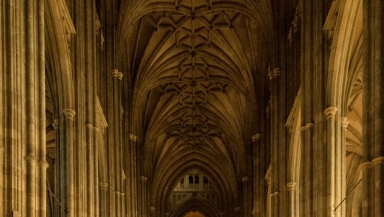
2020 is an important year for pilgrimage in England, marking 850 years since the murder of Thomas Becket at Canterbury Cathedral on 29 December 1170, and 800 years since the translation of his body to Trinity Chapel on 7 July 1220.
Along with an impressive array of the great and good of medieval Europe, the young Henry III was present for the latter event, which established Canterbury as the most important Christian pilgrimage destination after Jerusalem, Rome and Santiago.
As you would expect, the anniversary has generated a lot of excitement. A whole year of events have been organised in Canterbury, London and further afield. The Centre for Christianity and Culture at York University has even generated 3d recreations of the shrine.
There are a variety of ways to take part. Events include an exhibition at the British Museum, screenings of "Murder in the Cathedral", lectures, children's workshops and a medieval pageant.
During the anniversary weekend itself there will be services in the Cathedral. One of the most interesting developments is the creation of a cope based on a design from an Archbishop's tomb, which will be blessed on July 4 and used for the Becket2020 Services.
Those wishing to walk to Canterbury have a choice of routes. The Pilgrim's Way, from either Winchester or Southwark is the most famous. However, there are new alternatives, including the Old Way from Southampton and the Augustine Camino from Rochester. The Augustine Camino aims to give pilgrims the fullest medieval experience, including visits to shrines and monasteries.
The experience of modern pilgrimage surprises many participants. The Kent countryside is very rural despite its proximity to London. Woods and orchards are interspersed with hop gardens and vineyards, while the villages and pubs are picture perfect.
Walking gives pilgrims the chance to talk if they like, or just admire the view in silence.
And the spiritual side of pilgrimage is not neglected. The old custom of welcoming pilgrims has been re-established in various ways. The Cathedrals have teams of clergy able to meet pilgrims and offer blessings. There are shrines and chapels where prayers can be said. And pilgrim passports are now available in every Church of England cathedral.
This year will see the introduction of a Compostela (certificate of completion) on the Augustine Camino with similar rules as per Santiago in Spain. These will be issued to pilgrims who have walked at least 100 km (the length of the Augustine Camino) and collected at least two pilgrim stamps for each leg of the walk. Those with less time (or energy) to spare can join one of the many day walks being organised by various groups listed here.
These include a walk along the last four miles of the old pilgrim route into Canterbury, arriving in time for Evensong at the cathedral.
It is heartening to visit so many holy places and realise how blessed we still are. And it is also heartening to know that pilgrimage is alive and well in England. There has never been a better time to join in.
Andrew Kelly is the founder of the Augustine Camino and a keen walker. Find out more about the Augustine Camino at http://augustinecamino.co.uk/













